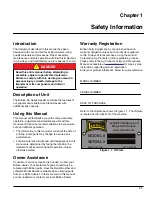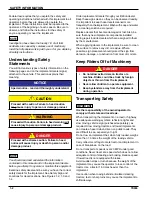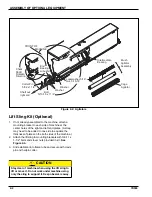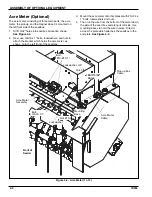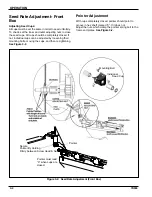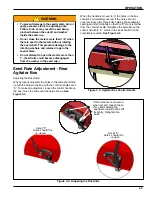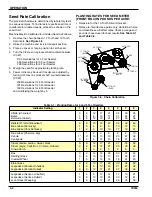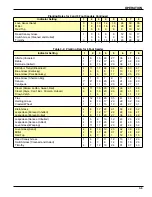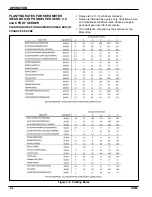
SAFETY INFORMATION
1-3
Keep clear of overhead power lines and other
obstructions when transporting. Know transport height
and width of your implement. Refer to transport
dimensions. See Table 4-2.
Attaching, Detaching and
Storage
• Do not stand between the tractor and implement when
attaching or detaching implement unless both are
incapable of moving.
• Before applying pressure to the hydraulic system, be
sure all connections are tight and that hydraulic lines
and hoses are not damaged.
• Lower implement to the ground when not in use so
that the shanks are taking the load.
• Block implement so it will not roll when unhitched from
the tractor.
• Relieve pressure in hydraulic lines before uncoupling
hydraulic hoses from tractor.
NOTE
On most tractors relieving hydraulic pressure can be
accomplished by operating valves after the engine is
stopped.
Maintenance Safety
Block the implement so it will not roll when working on or
under it to prevent injury in case of hydraulic failure or
inadvertent lowering by another person.
Do not make adjustments or lubricate implement while it
is in motion.
Make sure all moving parts have stopped and all system
pressure is relieved.
Understand all maintenance procedures before doing the
work. Use the proper tools and equipment.
High Pressure Fluid Safety
Escaping fluid under pressure can be nearly invisible and
have enough force to penetrate the skin, causing serious
injury. Use a piece of cardboard, rather than hands, to
search for suspected leaks.
Any fluid injected into the skin must be surgically
removed within a few hours or gangrene may result.
Avoid the hazard by relieving pressure before
disconnecting hydraulic lines.
NOTE
On most tractors relieving hydraulic pressure can be
accomplished by operating valves after the engine is
stopped. Also, the implement should be lowered to the
ground so that the shanks are taking the load.
Wear protective gloves and safety glasses or goggles
when working with hydraulic systems.
Protective Equipment
• Wear protective clothing and equipment.
• Wear clothing and equipment appropriate for the job.
Avoid loose fitting clothing.
• Because prolonged exposure to loud noise can cause
hearing impairment or hearing loss, wear suitable
hearing protection, such as earmuffs or earplugs.
Chemical Safety
Agricultural chemicals can be dangerous.
Improper use can seriously injure persons, animals,
plants, soil and property.
Read chemical manufacture’s instructions and store or
dispose of unused chemicals as specified.
Handle chemicals with care and avoid inhaling smoke
from any type of chemical fire.
Store or dispose of unused chemicals as specified by the
chemical manufacturer.
Prepare for Emergencies
• Keep a First Aid Kit and Fire Extinguisher handy.
• Keep emergency numbers for doctor, ambulance,
hospital and fire department near the phone.





